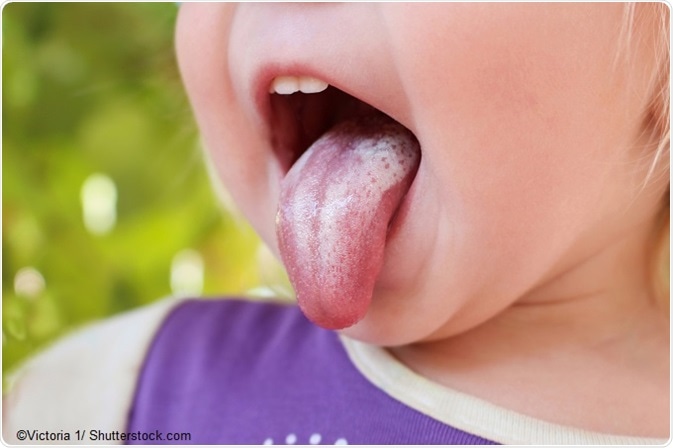For The Latest Medical News, Health News, Research News, COVID-19 News, Pharma News, Glaucoma News, Diabetes News, Herb News, Phytochemical News, Thailand Cannabis News, Cancer News, Doctor News, Thailand Hospital News, Oral Cancer News, Thailand Doctors
Oral thrush is a fungal infection of the mouth caused by infection with the fungus Candida albicans. Oral thrush can affect anyone, but those at particular risk include the elderly, those with weakened immune systems and babies.
Candida albicans is present at low levels in the mouth of healthy people and does not usually cause any problems. However, if the fungus overgrows and infects the mucous lining of the mouth, symptoms of oral candidiasis may develop.

Oral thrush is more likely to affect babies because their immune systems have not yet matured and are not as resistant to infection. Premature babies are at particular risk. Another risk factor for babies is the use of antibiotics, which can deplete the level of “good” bacteria in the mouth and free up space and nutrients for the growth of “bad” microbes. The balance of good and bad microbes can also be disrupted when a mother takes antibiotics, which can lead to a thrush infection in the mother that could be passed on to a baby during breastfeeding.
The main sign that a baby has oral thrush is the presence of a white coating on the baby’s tongue. This coating cannot be easily wiped away, so a coating that is easily removed is more likely to be a coating of milk rather than oral thrush. Creamy-white lesions may also be apparent in other parts of the mouth such as the inner cheeks, tonsils, roof of the mouth and gums. A baby may not appear to be bothered by the lesions, but if the lesions are sore, the baby may seem less keen to feed or may keep pulling away from the breast. Candida albicans can also cause a nappy rash.
Although this infection is usually harmless, it does require treatment. A doctor can usually diagnose oral thrush simply by examining the mouth, but a swab may be taken from the mouth for laboratory testing in order to confirm the diagnosis. Oral thrush in babies is treated with antifungal medication, the two commonly prescribed drugs being nystatin and miconazole. These medications are usually taken up to four times a day and treatment should be continued for two days after symptoms seem to have cleared up, to prevent recurrence. The medication is most effective when it is taken after a baby has been fed or has taken a drink.
It is not known whether oral thrush can be prevented in babies, but some experts think taking the following measures may help to stop an infection developing: